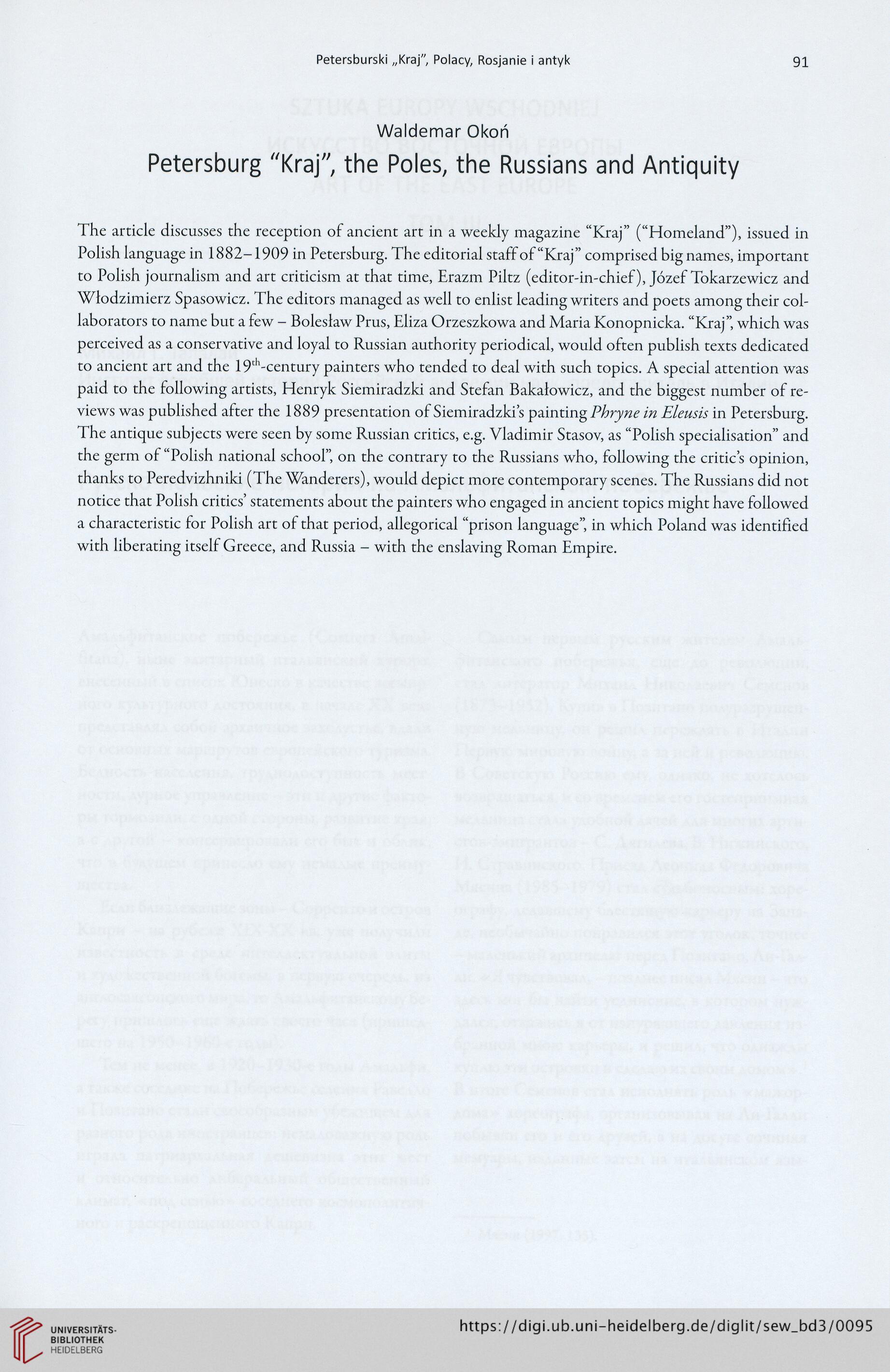Petersburski „Kraj", Polacy, Rosjanie i antyk
91
Waldemar Okoń
Petersburg "Kraj", the Poles, the Russians and Antiquity
The article discusses the reception of ancient art in a weekly magazine “Kraj” (“Homeland”), issued in
Polish language in 1882-1909 in Petersburg. The editorial Staff of “Kraj” comprised bignames, important
to Polish journalism and art criticism at that time, Erazm Piltz (editor-in-chief), Józef Tokarzewicz and
Włodzimierz Spasowicz. The editors managed as well to enlist leading writers and poets among their col-
laborators to name but a few - Bolesław Prus, Eliza Orzeszkowa and Maria Konopnicka. “Kraj”, which was
perceived as a conservative and loyal to Russian authority periodical, would often publish texts dedicated
to ancient art and the 19th-century painters who tended to deal with such topics. A special attention was
paid to the following artists, Henryk Siemiradzki and Stefan Bakałowicz, and the biggest number of re-
views was published after the 1889 presentation of Siemiradzki s paintingPhryne in Eleusis in Petersburg.
The antique subjects were seen by some Russian critics, e.g. Vladimir Stasov, as “Polish specialisation” and
the germ of “Polish national school”, on the contrary to the Russians who, following the critics opinion,
thanks to Peredvizhniki (The Wanderers), would depict morę contemporary scenes. The Russians did not
notice that Polish critics’ statements about the painters who engaged in ancient topics might have followed
a characteristic for Polish art of that period, allegorical “prison language”, in which Poland was identified
with liberating itself Greece, and Russia - with the enslaving Roman Empire.
91
Waldemar Okoń
Petersburg "Kraj", the Poles, the Russians and Antiquity
The article discusses the reception of ancient art in a weekly magazine “Kraj” (“Homeland”), issued in
Polish language in 1882-1909 in Petersburg. The editorial Staff of “Kraj” comprised bignames, important
to Polish journalism and art criticism at that time, Erazm Piltz (editor-in-chief), Józef Tokarzewicz and
Włodzimierz Spasowicz. The editors managed as well to enlist leading writers and poets among their col-
laborators to name but a few - Bolesław Prus, Eliza Orzeszkowa and Maria Konopnicka. “Kraj”, which was
perceived as a conservative and loyal to Russian authority periodical, would often publish texts dedicated
to ancient art and the 19th-century painters who tended to deal with such topics. A special attention was
paid to the following artists, Henryk Siemiradzki and Stefan Bakałowicz, and the biggest number of re-
views was published after the 1889 presentation of Siemiradzki s paintingPhryne in Eleusis in Petersburg.
The antique subjects were seen by some Russian critics, e.g. Vladimir Stasov, as “Polish specialisation” and
the germ of “Polish national school”, on the contrary to the Russians who, following the critics opinion,
thanks to Peredvizhniki (The Wanderers), would depict morę contemporary scenes. The Russians did not
notice that Polish critics’ statements about the painters who engaged in ancient topics might have followed
a characteristic for Polish art of that period, allegorical “prison language”, in which Poland was identified
with liberating itself Greece, and Russia - with the enslaving Roman Empire.




